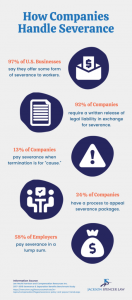What to Know About Severance Pay
Know About Severance Pay
Whether you’re leaving the workforce for retirement, moving on from a company or losing your job through a layoff, a comprehensive severance package can make the transition less stressful. But before you accept that severance pay, make sure you’re clear on its terms and what it means for your financial situation.
Severance pay is compensation a company pays an employee after their employment relationship ends, typically due to a layoff, downsizing or termination without cause. It can include a lump sum or regular payments based on the length of service, and may also include other benefits like health insurance, outplacement services, unused vacation or sick time and company equipment.
While companies aren’t required to offer severance packages, they do often choose to provide them as a show of goodwill and compassion, particularly during a large-scale layoff or restructuring. Offering severance pay and other benefits can help reduce the impact on departing employees and protect the employer from potential legal liability associated with wrongful termination, according to Fordham economics professor Giacomo Santangelo.
The decision to terminate even loyal employees is never easy for business leaders, but it can be even more difficult for the departing workers. The best way for a company to ease the blow is to offer a severance package that includes continued benefits, career consultation services and other perks like stock options or the option to keep a company cell phone. This will help ensure that the workers are not left out in the cold during a difficult time, and will likely encourage them to work with the company again in the future, according to the U.S. Department of Labor.

What to Know About Severance Pay
Severance packages can be complicated, and some states have laws that determine what types of benefits are included. Employees should research what is standard in their field or profession and for the size of their employer, to understand what kind of benefits they are entitled to receive. In addition, if they decide to accept the severance package, they should carefully review any severance agreement that includes a release of claims against the company and a non-compete clause that prevents them from working for competitors.
It is important for workers to remember that how to get severance pay and any other additional compensation they receive is taxable income. The tax impact can be significant, so it’s a good idea to consult a certified public accountant or other tax specialist before deciding to accept any severance package offers. Ideally, workers should also set up an emergency savings account to cover the period of unemployment they will face while looking for a new job. NerdWallet’s employment and taxes expert Sahara Pynes suggests having enough money in savings to last about 26 weeks. That’s how long it takes for most people to qualify for state unemployment benefits, and the duration of those benefits varies by state.
Furthermore, certain situations may entitle employees to severance pay beyond what is outlined in company policies or contracts. For instance, if an employer breaches an employment contract or if the layoff is deemed discriminatory based on factors such as race, gender, age, or disability, the affected employees may be entitled to additional severance pay or other forms of compensation through legal recourse.
Leave a Reply